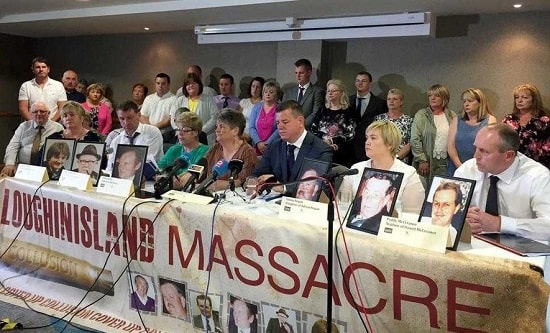
Controversy continues to surround a 2016 Police Ombudsman report on Royal Ulster Constabulary (RUC) collusion in the 1994 Loughinisland Massacre in which eleven men were riddled with bullets while sitting at a bar, watching Ireland’s famous World Cup win over Italy. The attack was claimed by the Ulster Volunteer Force – one of several flags of convenience under which British (unofficial) state forces manoeuvred in their dirty war against the Irish people. Loughinisland was part of a coordinated escalation of loyalist violence in the months that preceded the Irish Republican Army ceasefire of August 1994.
In 2017 US director Alex Gibney’s film on the subject, No Stone Unturned, was released to significant international acclaim and news coverage – outside of Britain that is. Still, earlier attempts to premiere the film in New York and Toronto saw it pulled last-minute by its producers, citing unspecified ‘legal issues’. Gibney’s film named the alleged gunmen and accomplices for the first time, identifying one as an agent of the RUC Special Branch.
Stephen Martin, Assistant Chief Constable of the Police Service of Northern Ireland (PSNI, as the RUC is now called) was naturally appalled. He assured us his detectives would be carefully reviewing the film and investigating suspected collusion – collusion between the filmmakers and the Ombudsman’s Office that is. Officials of that supposed watchdog helpfully reported the ‘crime’ to the PSNI. Since then, not a stone has gone unturned in finding out just how such ‘sensitive documents’ ended up in the hands of this nosy foreigner.
But for the PSNI to investigate publication of documents relating to their own criminal activity, and reported to them by a body putatively set up to keep an eye on them, must involve some conflict of interest surely? Well you needn’t have feared. Durham Constabulary have been at hand to conduct an entirely independent investigation into the suspected ‘theft (!) of confidential documents’. And on 31 August 2018, having been flown to Belfast, a handful of Durham’s finest – flanked by a small army of PSNI officers – conducted the arrest and questioning of two Irish journalists involved in the making of the film, their homes and offices turned upside-down. Following the arrests, Durham police released a statement warning that ‘the theft of these documents potentially puts lives at risk.’ To the relatives of those who died on the floor of Loughinisland’s Heights Bar on 18 June 1994, a more perfect insult could hardly have been conceived.
As for the Ombudsman’s report on which the film centres, it has already been in the dock. Sitting in the High Court in December 2017 Mr Justice Bernard McCloskey declared the Ombudsman had ‘exceeded his powers’, that his language was ‘thoughtless’, his conclusions ‘unsustainable in law’. The legal challenge was brought by two retired RUC officers, including former Assistant Chief Constable and Special Branch veteran Raymond White. That would be the same Mr White who, in 2001, challenged the report of former Ombudsman Nuala O’Loan which found ‘failings’ in the RUC investigation of the Omagh Bombing. In that case Mr White was ably assisted by a certain Bernanrd McCloskey – then QC – seven years before he donned the sash. The judicial sash, that is. The courts will now decide whether to formally quash the findings of the Loughinisland report.
From the PSNI top brass to the High Court, the message to international journalism and their would-be sources is quite clear: Trump? Fair game. Putin, even better. But don’t investigate the British state and expect to get off lightly.




